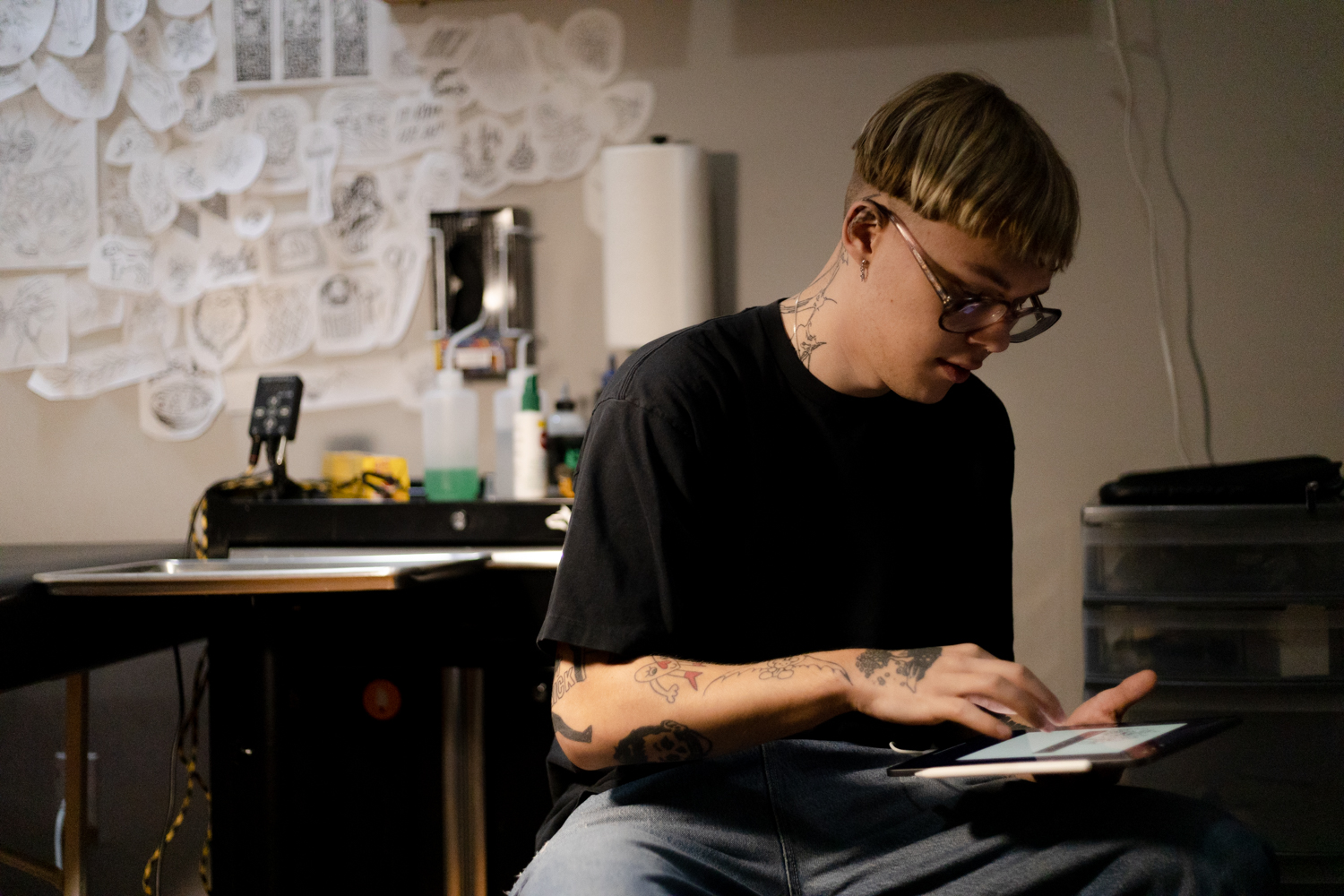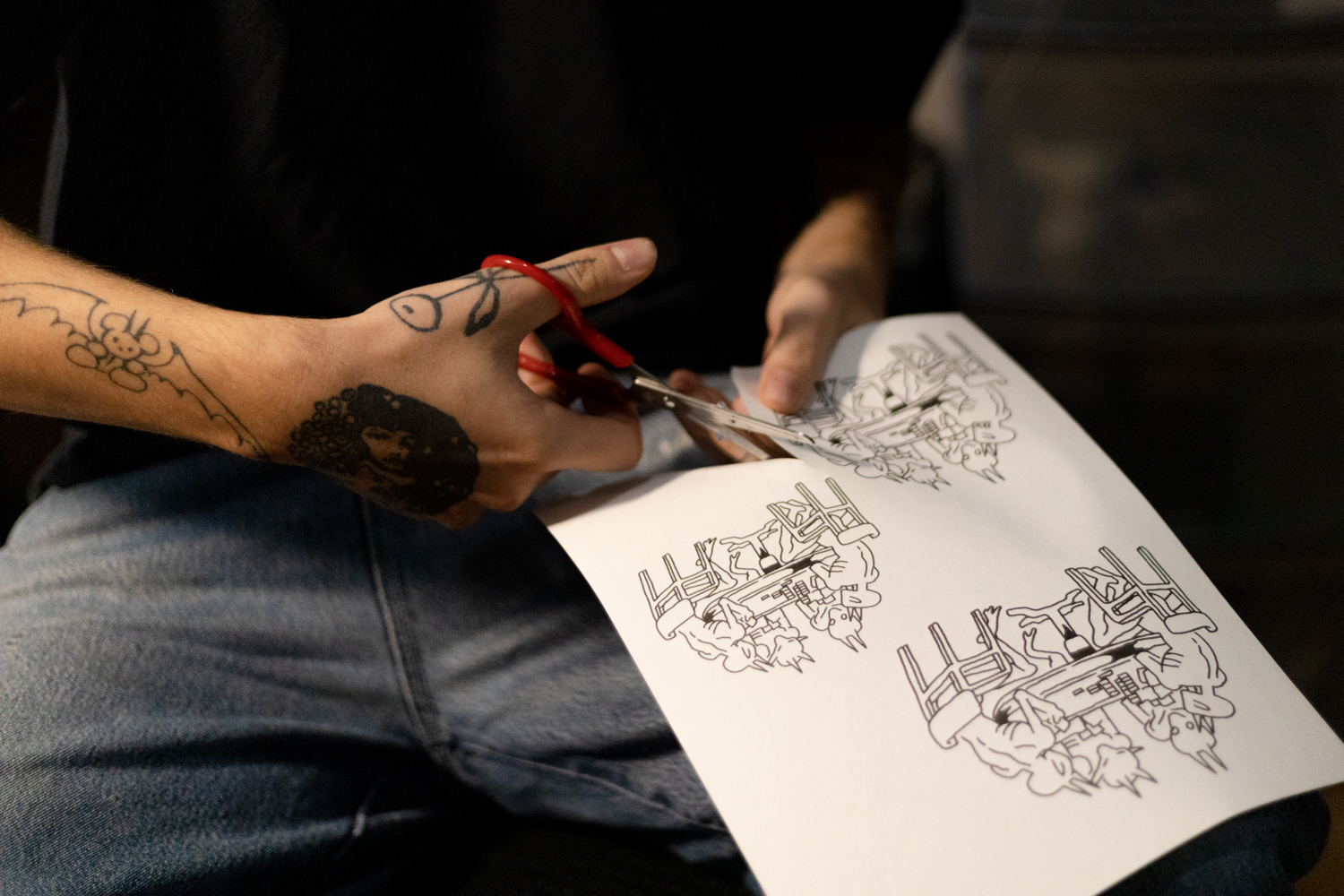Montreal is a hub for the tattoo industry, and a new kind of tattoo artist is rising to the forefront of the business
While apprenticeships have been the only way to get into the tattoo industry for years, the pandemic led the way for self-taught tattoo artists to set up shop in their own homes. The Concordian spoke with one such member of this new wave of self-taught tattoo artists, Clara Suess.
“One of my first tattoos is one I’ve done myself,” said Suess while revealing an ever-so-slightly smudged, yet recognizable tattoo of the Pokémon Gengar on her ankle. “It’s a little ugly but it does the trick, it’s not that bad.”
Suess recently celebrated her first anniversary of tattooing. Since her start, she has grown exponentially and developed her style, which is mainly inspired by biology.
Over the course of an average week, she tattoos around five people. Suess has also amassed close to 700 followers on Instagram, and has joined a collective of like-minded tattoo artists.
While she started in her parent’s basement with a machine ordered from the internet, she has been working for six months on Jean-Talon Street with a few other young self-taught tattoo artists who call themselves the Collectif 456.
The Collectif 456 works in a collaborative space used by music and tattoo artists. The space that was formerly the apartment of one of their music producers, is eclectic, much like the artists it hosts. It features two music studios, two tattoo studios and a homemade stage to create a homely environment where collaboration is strongly encouraged.
Self-taught tattoo artist and co-founder of Collectif 456 Raphaël Bonneau-Bédard. CATHERINE REYNOLDS/The Concordian
The idea sprouted in collaboration with tattoo artist Raphaël Bonneau-Bédard, a tattoo artist and a friend of Suess’ who quickly became her colleague.
Bonneau-Bédard began tattooing two years ago when their tattoo artist saw their artwork and suggested they pursue tattooing as well. Bonneau-Bédard bought their first tattoo machine from that very same artist, who told them they were on their own for the rest.
“I ordered everything I needed, checked YouTube videos and I just tattooed my friends and people started talking about me,” Bonneau-Bédard said. “I told myself if I were to start tattooing I would do it alone.”
Suess, Bonneau-Bédard and the tattoo artists of the Collectif 456 are part of a new wave of tattoo artists who’ve taught themselves how to tattoo people, a practice that blossomed in Montreal during the COVID-19 pandemic.
“Montreal has always been known as one of the tattoo capitals of the world,” said Rodolphe Erinoff, a tattoo artist of 11 years and owner of La Planque, a tattoo studio on Mont-Royal Ave.
“It’s such an artistic city that’s renowned on many levels,” he emphasized. “Whether it be music, tattooing or street art, we are known to be a very artistically-developed city.”
Raphaël Bonneau-Bédard cuts out a stencil at Collectif 456. CATHERINE REYNOLDS/The Concordian
Quebec doesn’t have any laws prohibiting minors from getting tattoos. Additionally, tattoo artists do not have to abide by any safety regulations or go through traditional apprenticeships to practice tattooing.
Young people in Quebec are getting tattooed exponentially more. A recent survey by Ipsos found that 25 per cent of Quebecers are tattooed. Both Suess and Bonneau-Bédard had gotten tattoos either on or before their 18th birthday.
“It became a trend,” said Alex Fombelle, a student at the Cégep du Vieux-Montréal who got tattooed for the first time at 16 in a salon. It was an experience that forever changed the way Fombelle would choose where and by whom she would get tattoos from.
“I saw other clients and it would stress me out to see them getting tattooed, ” Fombelle added. “There was also the boss who always came to check on what the artist was doing and I could see it stressed her out too.”
Then they got tattooed in the home of a self-taught tattoo artist. The privacy, warmth and friendliness of the space made them instantly comfortable. She felt like she could truly share a personal moment with the artist.
When the pandemic hit, many people realized how accessible it is to start at home, even without an apprenticeship. Though hygienic practices aren’t enforced by law whether in the homes of new artists or traditional studios, artists like those at Collectif 456 take hygiene extremely seriously.
“Raphaël and I have followed an online course on cross-contamination, bloodborne pathogens and safety techniques,” said Suess, who cites Progressive Mentorship as her source. It was “a matter of principle” to her. Bonneau-Bédard also mentioned it’s a crucial first step for anyone getting into tattooing.
However, the lack of codified safety regulations worries older tattoo artists like Erinoff, especially when it comes to self-taught artists.
“We think we can learn by ourselves,” said Erinoff. “Yes, we can acquire certain techniques, but true professional techniques, there’s nothing like experienced people to show us how it’s done.”
Erinoff himself tried his hand at self-teaching before deciding to take on an apprenticeship after two to three years of tattooing people. He calls his beginnings as a self-taught tattoo artist “the worst mistake he’s ever made.”
“By not being trained by people that were more professional than I was with more experience, I didn’t move forward in my career,” he explained. “I was stagnant, I didn’t progress and I had no vision. I evolved through being accompanied by an experienced professional that knew what to do and more specifically, what not to do.”
Eventually, he went on to create his studio. His utmost priority is his clients’ comfort. Upon walking into his tattoo shop, it’s easy to notice how bright, warm and open everything is. It’s a long way from the dark, old-school stereotypical vibe of most tattoo shops.
The realization quickly sets in regarding how much the scene changed in the last few years. Situated on top of a bar on Mont-Royal Ave, Erinoff says after a hard day’s work, his team often rejoices with a beer.
However, Erinoff emphasizes the distinction between warmth and quality in a parlour. “If you go to a convivial place and the work doesn’t follow, it amounts to nothing.”
People seeking to get tattoos have never had such a dizzying amount of choice, which they have to research with hygiene and quality of work at the forefront of their decision, a consensus among the tattoo community.
Nonetheless, self-taught tattoo artists like Bonneau-Bédard are confident about the future of their practice and love the name they’ve made for themselves from the ground up.
“I’ll be a tattoo artist or I will die trying,” Bonneau said. “I take pride in having my own space that I built myself with my friends. It’s so much cooler than joining an already established studio. The aim of the game is to stick with the collective.”
All the signs point to a huge rise in the number of self-taught-tattoo artists in Montreal. However, since there are no laws surrounding their practices and considering the fact that tattoo artists just have to declare their revenue as self-employed workers, there are very few statistics on the subject.
With more people getting tattooed in a casual way, self-taught tattoo artists are likely to ride their wave for a long time.






